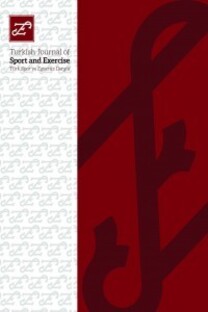Investigation of Teachers’ Self Efficieny of Educational Game Teaching: Case of Alanya
Bu çalışmada (i) öğretmenlerin eğitsel oyun oynatma öz-yeterliklerinin cinsiyet, medeni durum, eğitim durumu, yaş, kıdem, farklı branşlar açısından karşılaştırılması ve (ii) eğitsel oyun oynama öz-yeterlik düzeylerinin incelenmesi amaçlanmıştır. Araştırmada genel tarama yöntemi kullanılmıştır. Araştırmanın örneklem grubunu Alanya ilçesinde görev yapan 50 beden eğitimi ve spor, 50 okul öncesi ve 50 sınıf öğretmeni olmak üzere toplam 150 öğretmen oluşturmaktadır. Verilerin toplanmasında Altınkök ve Yılmaz (2018) tarafından geliştirilen 'Eğitsel Oyun Öz-Yeterlik Ölçeği' ve demografik bilgi formu, çalışmaya gönüllü olarak katılan bireylere Google® formları aracılığıyla online olarak uygulanmıştır. Çalışmadan elde edilen veriler IBM SPSS 25.0 istatistik paket programı kullanılarak analiz edilmiştir. Veriler basıklık ve çarpıklık testi sonucunda normal dağılım gösterdiğinden ikili değişkenler için Independent T testi, üç ve daha fazla değişken için One Way Anova testi kullanılmıştır. Bulgular sonucunda katılımcıların eğitsel oyun oynatma yeterliliklerinde yaş, kıdem ve branş değişkenleri açısından anlamlı bir farklılık olduğu tespit edilmiştir. Ancak cinsiyet ve eğitim durumu değişkeni açısından anlamlı bir farklılık bulunmamıştır. Ayrıca beden eğitimi ve spor öğretmenlerin eğitsel oyun oynatma öz yeterliklerinin diğer branş öğretmenlerine göre daha iyi olduğu görülürken, okul öncesi öğretmenlerin uygulama boyutundaki yeterlik düzeyleri diğer branşlara göre daha düşüktür. Öğretmenlerin eğitsel oyun oynatma öz-yeterliklerinin yüksek düzeyde olduğu ancak bazı değişkenler açısından eğitsel oyun oynatma öz-yeterliklerinde farklılıklar olduğu belirlenmiştir.
Investigation of Teachers’ Self Efficieny of Educational Game Teaching: Case of Alanya
In this study, it was aimed (i) to compare teachers' educational game playing self-efficacy in terms of gender, age, marital status, educational status, seniority, different branches and (ii) to examine educational game playing self-efficacy levels. General survey method was used in the research. The sample group of the study consisted of 50 physical education and sports, 50 preschool and 50 classroom teachers, totalling 150 teachers working in Alanya district. In data collection, the 'Educational Play Self-Efficacy Scale' developed by Altınkök and Yılmaz (2018) and the demographic information form were applied online via Google® forms to the individuals who voluntarily participated in the study. The data obtained from the study were analysed using IBM SPSS 25.0 statistical package programme. Since the data showed normal distribution as a result of the kurtosis and skewness test, Independent T test was used for binary variables and One Way Anova test was used for three or more variables. As a result of the findings, it was determined that there was a significant difference in the participants' educational game playing competences in terms of age, seniority and branch variables. However, no significant difference was found in terms of gender and educational status variables. In addition, while physical education and sports teachers' self-efficacy in playing educational games is better than other branch teachers, pre-school teachers' efficacy levels in the application dimension are lower than other branches. It was determined that teachers' self-efficacy for playing educational games was at a high level, but there were differences in their self-efficacy for playing educational games in terms of some variables.
___
- 1. Akandere M. Eğitici okul oyunları. Ankara: Nobel Yayın Dağıtım. 2003.
2. Akçınar S. Beden Eğitimi Öğretmenlerinin Eğitsel Oyun Oynatma Becerilerinin İncelenmesi. Master's thesis, İnönü Üniversitesi Sağlık Bilimleri Enstitüsü. 2018.
